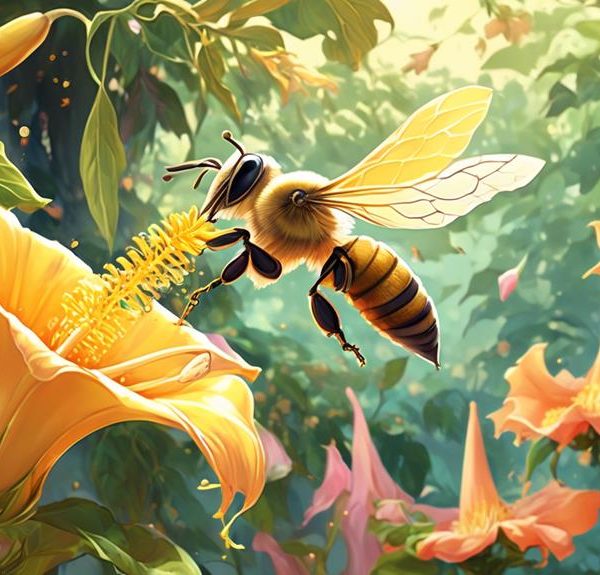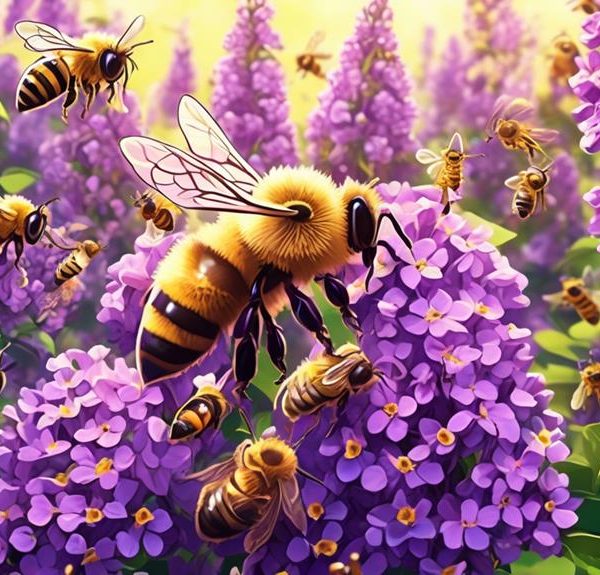Journey into the world of bees and their surprising love for buckwheat, revealing its impact on their colonies and our environment.
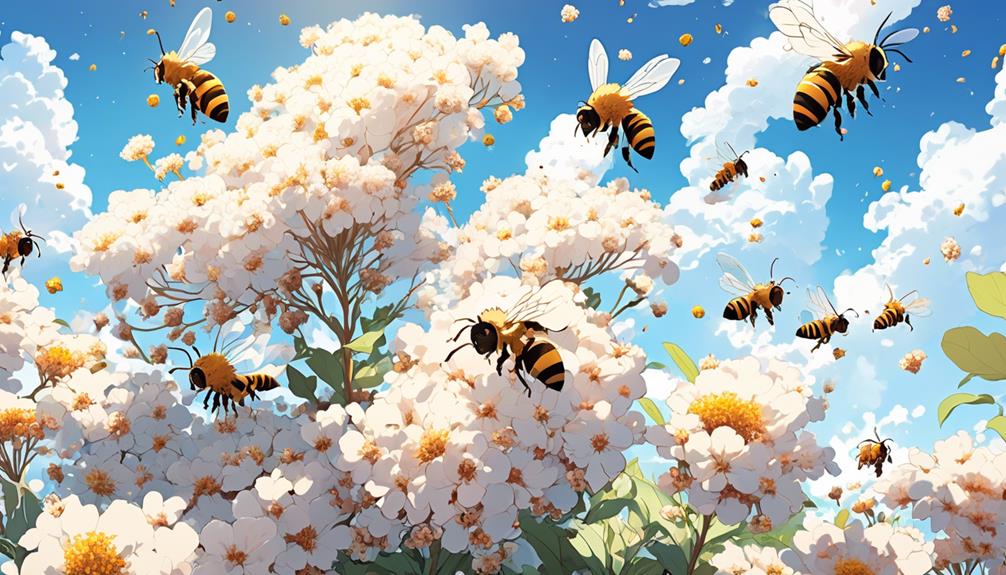
Do Bees Like Buckwheat
Just as a gourmet might be drawn to a five-star restaurant, bees too have their preferred dining spots. You've likely noticed bees buzzing around your garden, but have you ever stopped to consider what plants they're particularly fond of?
Buckwheat has been a topic of considerable interest in this context. It's not just a question of whether bees like buckwheat, but also why they might be attracted to it and how this could potentially impact their colonies and the environment.
Stick around, there's a lot more to uncover in this seemingly simple question.
Key Takeaways
- Bees are highly attracted to buckwheat due to its high nectar production and easily accessible flowers.
- Buckwheat provides bees with a rich source of sugars, amino acids, minerals, vitamins, and water, promoting their overall health and immune system.
- The visitation of bees to buckwheat fields enhances honey production, resulting in darker, robust honey with higher antioxidant properties.
- Buckwheat cultivation not only benefits bees and honey production but also promotes biodiversity, improves soil health, and increases agricultural yields.
Understanding Bee Attraction to Buckwheat
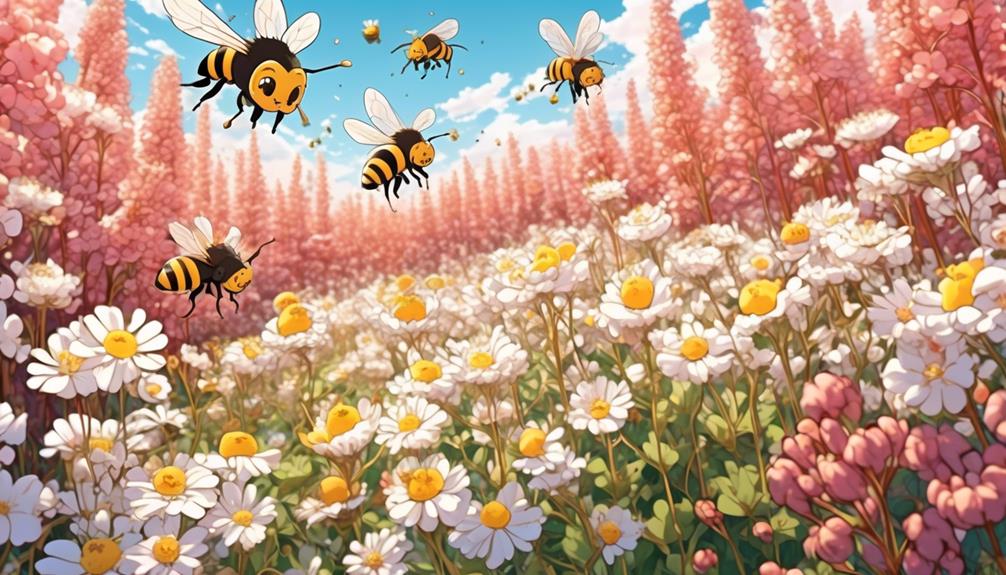
To truly comprehend why bees are drawn to buckwheat, it's essential to delve into the captivating world of bee behavior and plant pollination dynamics. Much of a bee's life revolves around foraging for nectar and pollen, crucial for their nutrition and the survival of their hive. Buckwheat's high nectar production and protein-rich pollen make it an attractive food source for bees.
Buckwheat flowers have a particular structure that's very inviting to bees. Their small, bell-shaped flowers, packed in dense clusters, are easily accessible to bees. Their bright white color and strong, sweet scent are like magnets, drawing bees in.
Furthermore, buckwheat bloom times align well with the bees' foraging patterns. They flower early in the morning, just when bees start their day. This synchronization increases the chance of pollination, beneficial both for the bees and the buckwheat plants.
Lastly, the sugar concentration of buckwheat nectar is relatively high, providing bees with the energy they need for their daily activities. The nectar's unique composition also contributes to the production of a distinct type of honey, appreciated by honey enthusiasts worldwide.
Understanding these dynamics helps explain why bees find buckwheat irresistible.
Nutritional Value of Buckwheat for Bees
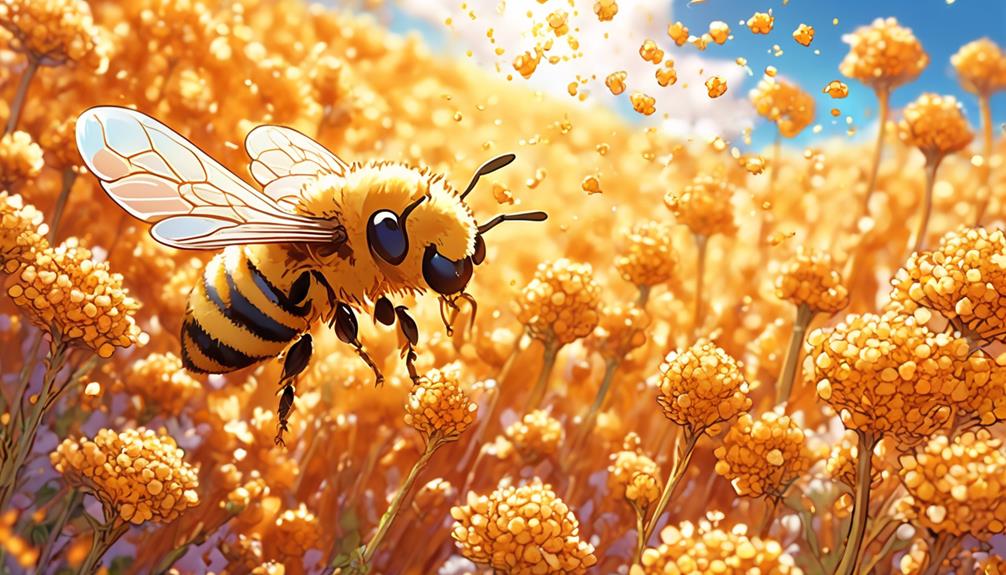
Building on the allure of buckwheat for bees, let's now examine the specific nutritional benefits this plant provides for our buzzing friends. Buckwheat nectar is rich in essential nutrients that bees need for their overall health and productivity. It's a veritable feast of sugars, amino acids, and minerals, all wrapped up in a delicious package that bees find irresistible.
But let's break it down a bit more. Here's a handy table that outlines the nutritional value of buckwheat for bees:
Nutrient | How it Benefits Bees | Found in Buckwheat |
|---|---|---|
Sugars | Provide energy | Yes |
Amino Acids | Protein source | Yes |
Minerals | Vital for health | Yes |
Vitamins | Boost immunity | Yes |
Water | Hydration | Yes |
From this table, you can see that buckwheat offers a complete nutritional profile for bees. The sugars give them the energy they need to forage and return to the hive, while amino acids offer essential proteins. Minerals and vitamins help to boost their health and immunity, and water keeps them hydrated.
Impact on Honey Production
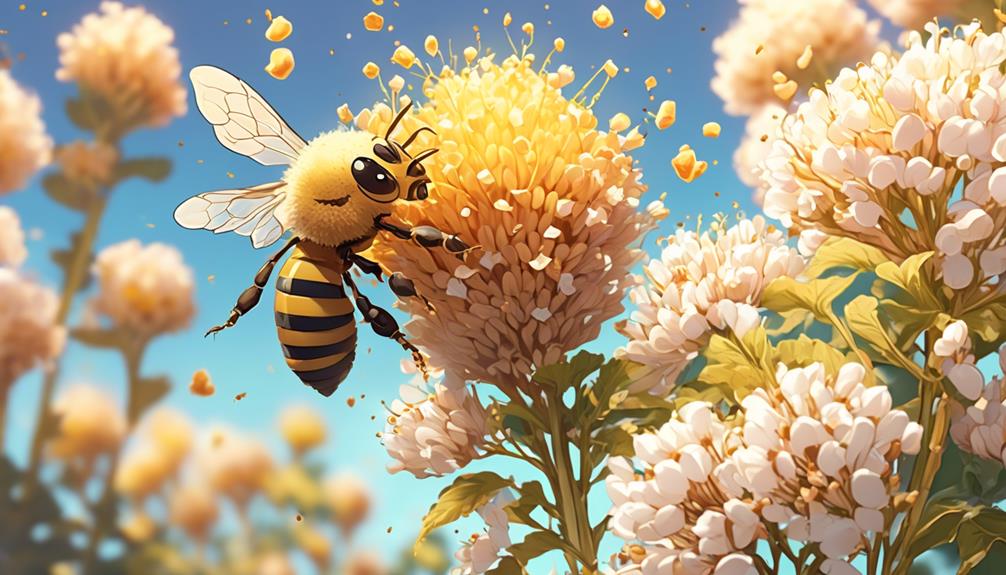
An interesting fact to consider is how buckwheat's nutritional richness directly influences honey production, enhancing not only the quantity but also the quality of the honey bees produce. Bees find buckwheat irresistible, and their visitations to buckwheat fields result in a darker, robust honey with a strong, distinctive flavor.
Buckwheat's high protein content, coupled with its rich assortment of vitamins and minerals, provides bees with a nutrient-dense food source. This nutritional boost, in turn, propels their honey-making processes. It's a fascinating cycle: the more nutrients bees ingest, the more energy they have to produce honey, and the more honey they produce, the stronger and healthier the hive becomes.
Furthermore, buckwheat honey is known to have higher antioxidant properties than many other types of honey. This is due to the variety of phytonutrients found in buckwheat flowers, which end up in the honey. These antioxidants give buckwheat honey its unique health benefits, such as promoting heart health and boosting the immune system.
Benefits for the Bee Colony

Feasting on buckwheat's nectar, bees not only increase their honey production but also experience significant benefits for their colony's overall health and vitality. Buckwheat's nectar is rich in essential nutrients, which can strengthen the bees' immune systems, promote healthy growth, and help the colony thrive.
Now, let's dive into the specific advantages of buckwheat nectar for bee colonies.
Benefit | Explanation | Impact on Colony |
|---|---|---|
Enhanced Immunity | Buckwheat nectar is packed with antioxidants that boost the bees' immune system. | A strong immune system helps the bees resist diseases and parasites, thereby increasing the colony's survival rate. |
Nutrient-Rich | This nectar contains essential nutrients like proteins and vitamins. | These nutrients promote healthy growth in bees, leading to a more robust and productive colony. |
Diverse Diet | Buckwheat adds variety to the bees' diet. | A diversified diet can lead to a healthier, more resilient colony. |
Implications for Environment and Agriculture

While it's clear that buckwheat's nectar offers substantial benefits for bee colonies, you might be wondering about its broader implications, particularly in terms of environmental sustainability and agricultural productivity.
Buckwheat's role in promoting bee health and population growth has significant implications for the environment. Bees, as primary pollinators, play a critical role in maintaining biodiversity by helping plants reproduce.
Moreover, buckwheat is a crop that can be cultivated on poor soils and doesn't require pesticides, adding to its environmental benefits. Its rapid growth also makes it an excellent cover crop, preventing soil erosion and improving soil health by adding organic matter and suppressing weeds.
On the agricultural side, bees' attraction to buckwheat can enhance crop pollination, leading to increased yields. This is especially true for crops that rely heavily on bee pollination, such as fruits and vegetables. Plus, buckwheat itself can be harvested for grain, offering farmers an additional source of income.
Frequently Asked Questions
Do Bees Prefer Buckwheat Over Other Types of Flowers?
Yes, bees do prefer buckwheat over other types of flowers. It's because buckwheat flowers produce a high amount of nectar, which attracts bees. They're drawn to its strong, sweet scent and the abundant food source it provides.
Can Buckwheat Be Harmful to Bees in Any Way?
No, buckwheat isn't harmful to bees. In fact, it's beneficial!
Bees are attracted to buckwheat's nectar, which they use to make honey. Buckwheat plants also provide important pollen for bees, aiding in their overall health and productivity.
Are There Specific Types of Bees That Are More Attracted to Buckwheat?
Yes, certain types of bees are more attracted to buckwheat. Honey bees in particular love buckwheat because it's a rich source of nectar. Buckwheat flowers produce a dark, strongly flavored honey that's highly prized.
However, it's not just honey bees that are drawn to buckwheat. Bumble bees and various types of solitary bees are also attracted to it. So, if you're keen on attracting bees, planting buckwheat is a good move.
How Does Buckwheat Compare to Other Plants in Terms of Providing Nutrition to Bees?
Buckwheat outshines many other plants when it comes to nourishing bees. It's a powerhouse, packed with nectar and pollen that bees need for survival. You'll find it has a higher protein content compared to other sources, which helps bees strengthen their immune systems.
Can Cultivating Buckwheat Help Increase the Population of Bees?
Yes, cultivating buckwheat can indeed boost the bee population.
You see, buckwheat flowers are a rich source of nectar, which bees love. They're even known to prefer buckwheat over other plants.
So, by planting more buckwheat, you're providing bees with more food, which can help their numbers grow.
Just remember, it's not a magic cure-all for declining bee populations, but it's definitely a step in the right direction.
Conclusion
Indeed, bees do love buckwheat. It's not only a rich source of nutrition, but it also boosts honey production and benefits the entire bee colony.
The buzz about buckwheat doesn't stop there; its implications for the environment and agriculture are equally significant. Planting more buckwheat could be a simple, yet effective strategy to support our hardworking bees and, in turn, our ecosystems and food systems.

